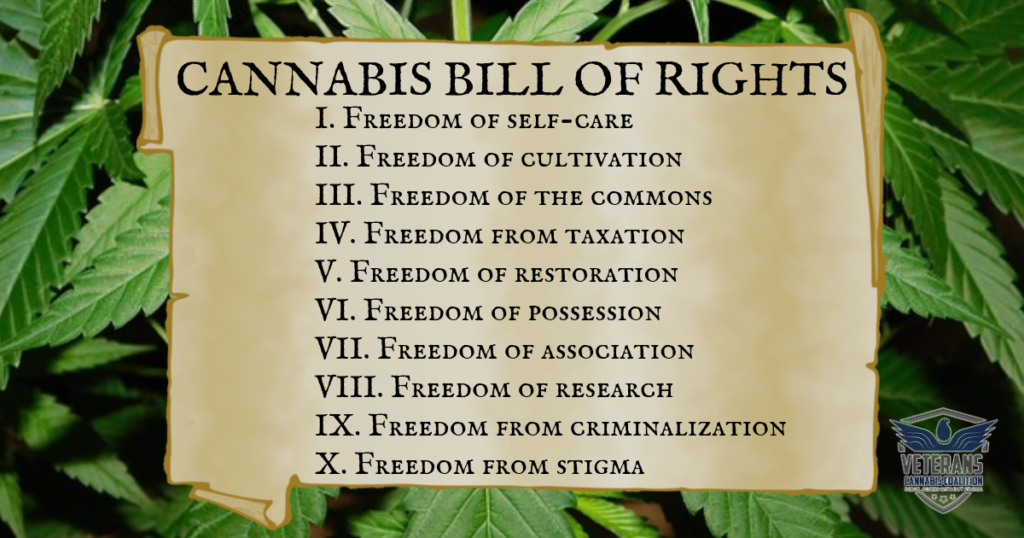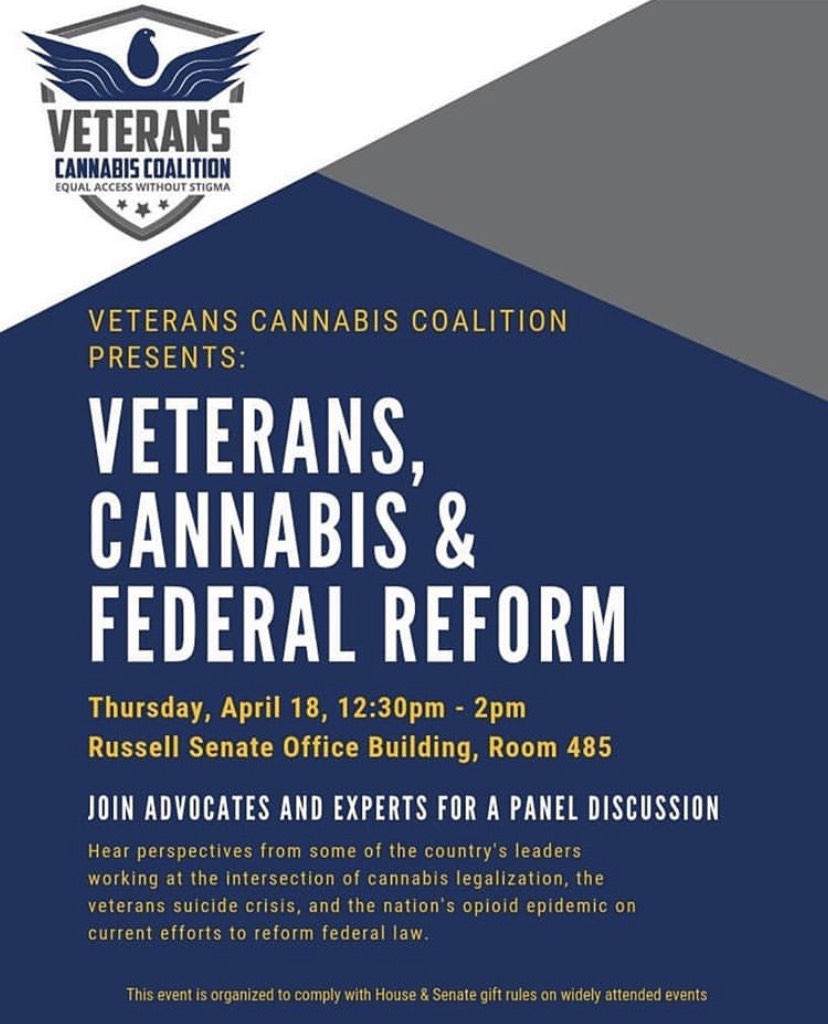Cannabis Bill of Rights

I. Freedom of self-care: no law or regulation shall infringe or impede an adult person’s absolute right to consume or otherwise use cannabis for any purpose.
II. Freedom of cultivation: no law or regulation shall prevent or restrict an adult person’s right to grow cannabis in their residence, whether rented, owned, or publicly-subsidized, for non-commercial purposes.
III. Freedom of the commons: all responsible government entities will ensure that unused or under-utilized public land and facilities are made available for noncommercial citizen cannabis collectives and co-ops.
IV. Freedom from taxation: no law or regulation shall levy direct taxes on any stage of the cannabis production process, from cultivation to consumer sales—cannabis should be treated for tax purposes as a food and medicine.
V. Freedom of restoration: all government judicial entities will endeavor to expunge, dismiss, and commute any and all cannabis related-convictions and charges for all persons with no cost to the individual.
VI. Freedom of possession: no law or regulation shall restrict or penalize personal cannabis possession and no cannabis can be seized by agents of the state without a court order.
VII. Freedom of association: no law or regulation shall restrict the ability of individuals to exercise their rights regarding cannabis collectively for non-commercial purposes.
VIII. Freedom of research: no law or regulation shall create specific barriers to the scientific investigation of cannabis.
IX. Freedom from criminalization: no law or regulation shall apply criminal penalties specific to the consumption, cultivation, possession, manufacture, sale, or transport of cannabis; any criminality related to cannabis (tax evasion, fraud, driving under the influence, etc.) shall be prosecuted under existing law.
X. Freedom from stigma: no law, regulation, or judicial action shall use the presence or consumption of cannabis as an aggravating or disqualifying factor in court proceedings, employment, or any other government considerations.

This Cannabis Bill of Rights has been thoughtfully collated by our good friends over at Veterans Cannabis Coalition and we cannot think of a better messenger to take these ten demands to the nation’s capital on behalf of all cannabis users.
In the past we have written about 5 Things We Must Demand From Any Future Cannabis Legalization Measures but, admittedly, it comes up short on outlining and defining all of the essential rights we intend to keep fighting for. So we’re proud to endorse this effort by Veterans Cannabis Coalition.
Though they are all perfectly concise and very self-explanatory, below we will briefly flesh out each plank, 1-10, with some relevant stories or examples that we have come across in our research or day to day experience in the culture and industry.
I. SELF CARE
We have been exhaustively reporting on the battle lines being formed right now before our eyes between THC and CBD. Knowing full well that they have failed their ultimate mission of keeping cannabis scary and illegal, a dwindling number of prohibitionists are lashing out with all they have left, a fact-free fear campaign to demonize THC.
Currently, 13 states have enacted medical marijuana programs consisting only of low/no-THC, CBD-only products. Even in states with a more comprehensive medical marijuana program in place, there is a lot of misinformation being spread about consuming THC strictly for fun and CBD strictly for healing.
In Florida, for example, medical marijuana patients have been fighting for nearly two years for the right to smoke cannabis. It took the installment of a new governor to get lawmakers to budge on the issue and now some are trying to cap THC on cannabis flower at just 10%.
We don’t need out of touch local lawmakers creating a crooked patchwork of regulations that vary from state to state, or even county to county. We don’t need people who know less than nothing about cannabis making a decision for us about which cannabinoids work for us and how we ought to consume them.
What we demand is recognition of our fundamental and sovereign rights as adults to consume cannabis however we choose to.
II. CULTIVATION
This one right here is so crucial. This, in my opinion, is one of the largest impediments to true cannabis reform at the federal level. We are already seeing that state-level lawmakers are swayed by mounting evidence of the safety and even medicinal value of the cannabis plant, but let’s face it, they are actually moved into action once they see projections of massive tax revenue windfalls from it.
But if we can just grow our own, how do they jam their sticky hands into our gardens to extract their precious taxes?
California’s legal cannabis market is gushing blood from a thousand self-inflicted regulatory papercuts, including an unsustainable stacking of taxes up and down the supply chain, but at least residents in the Golden State retained the right to grow their own at home, as restricted as it may be.
In Missouri, for example, medical marijuana patients are allowed to grow up to 6 flowering plants, but it must be done in a “closed, locked location”. That immediately negates any hope of sun-grown cannabis and is not good enough.
In Utah, the voters approved a new medical marijuana law that initially allowed home cultivation, but corrupt lawmakers drafted and passed replacement legislation after the public vote, stripping residents’ right to home grown cannabis.
What we love about the way this plank is written is that if an adult wants to grow cannabis for their own personal use, they must be allowed to do so whether they rent or own their home and regardless of any government subsidization of the property.
Let freedom GROW!
III. THE COMMONS
Did you know that the federal government spends more than $1.7 billion a year to maintain 770,000 empty buildings? Hundreds of thousands of office buildings, storage warehouses, courthouses, hospitals, parking garages and other structures sit unused, paid for by you and I.
Advantageous lawmakers have bought votes over the decades by vowing to convert swaths of this empty space to noble projects like homeless shelters, but since 1987 just 122 of 40,000 screened and approved federal properties have been transferred to homeless advocacy groups.
We demand that a significant slice of this space be apportioned for use by the citizens whose tax dollars fund it to create non-commercial collectives and cooperatives to grow, process, and distribute cannabis from.
IV. TAXATION
You can tax our gas. You can tax our properties. You can even tax our income. But you’re done taxing our weed. No more cultivation tax. No more excise or “Sin Tax”. No more tax at all whatsoever on any cannabis purchases – wholesale or retail. Zip, Zilch. Like medicine, it sustains us, not you.
Open up the free commerce of cannabis nationwide and trust me, you’ll get plenty of taxes from us in all other aspects of our lives.
Mention this demand to the most cannabis-friendly lawmaker you can find and test their real commitment to the movement.
V. RESTORATION
‘Expungement’ is the new buzzword in cannabis reform and it’s about damn time. The War on Drugs has had a detrimental effect on all levels of society but none more so than for those at the bottom. The poorest communities felt the full force of misguided law enforcement and minorities are still. . . STILL. . . up to 10x more likely to get arrested for cannabis than their Caucasian counterparts.
This is America.
Though it is making waves across the country now, expungement is not a new concept. But in many jurisdictions, former felons are not even aware of the option to seek to have their records reduced or wiped clean. In too many cases, the process is long and expensive, and may even require the hiring of a lawyer.
With all due respect, fuck that.
Make it free, make it easy.
VI. POSSESSION
This one is simple.
You smell weed in my car officer? That’s because it’s really good weed, sir. Now, I’ll be on my way.
No more stop & frisk, no more “decriminalizing” dime bags, and no more evidence rooms overflowing with allegedly legal weed.
VII. ASSOCIATION
Pure Beastie Boys right here. You’re damn right we’re gonna fight for our right to party! That’s just it though, gathering to exercise your rights as a cannabis user does not necessarily mean sprawling cannabis festivals staffed with bikini-clad dab-tenders, although we demand that too.
Gathering around a bowl or joint of cannabis is where ideas are born. It is where the activism fueling today’s movement took root. It is where compassion abounds and the lonely can find camaraderie.
We hike into the middle of nowhere with Veterans Walk & Talk to sesh with vets and hear their stories and there are always some sideways looks from other hikers who pass by our smoky sessions.
Playing off of the third plank, THE COMMONS, the VA building in LA is one of the federal governments most underused pieces of property. Give local SoCal veterans space there to assemble, sesh, and hash out their ups and downs together with a safe, legal, and natural alternative to the synthetic solutions being pushed to them now.
Yes, I do believe that there need to be some restrictions on public consumption but we demand that you tell us where we can get baked before you tell us where we cannot.
VIII. RESEARCH
The sad fact of cannabis is that some of the most innovative breakthroughs and discoveries about the plant have happened in basements, or garages, or on the side of a hill somewhere far away from any laboratory.
For decades, the federal government has put on a façade of curiosity at the University of Mississippi, the only DEA-approved campus for cultivating cannabis for research purposes. In 2017, PBS reported that this sole source for “research grade” (ahem, mids) cannabis was not lab testing the cannabinoid or terpene profiles of their crops, and that significant samples of their boof bud showed signs of mold.
As cannabis legalization sweeps the nation, more college campuses are conducting much-needed analysis of the plant but if they are playing by the rules, they are working with some terrible test material.
We demand that the government gets out of the way. Research firms and institutions should be rewarded or subsidized for doing this long overdue work that the government has, likely intentionally, fumbled for so long.
IX. CRIMINALIZATION
We have often referred to the ‘decriminalization’ of cannabis as less than a half-step in the right direction.
Traditionally, when a city, or county, or even an entire state decriminalizes weed it is good news for consumers on the demand side of the economic curve, and quasilegal business as usual for those operating in the shadows of the supply side.
While it generally protects those caught with minimal amounts of pot, it leaves those who grew it, bagged it up, and are trying to sell it hanging out to dry with no more protection from the law as before.
This demand will correct that and put strength back into the word “decriminalize”.
We have existing laws for actual criminals. If you are too intoxicated on cannabis to drive and it can be proven, we have DUI laws. If a grower decides to ball out and evade his tax obligation, we have laws for that already.
So when it comes to cannabis, we demand the right to grow it, smoke it, eat it, hold it, sell it, trade it, gift it, or do virtually anything else we want to do with it as long as our actions fall within the confines of the thousands of laws already on the books.
X. STIGMA
Say it with me: “I like weed and I’m a good person”
Louder for the hard of hearing on Capitol Hill: “I LIKE WEED AND I’M A GOOD PERSON!”
We’ve seen friends get evicted, careers get ruined, families get separated, and freedom ruthlessly stripped away over this harmless plant.
How many of you have had a pill-popping soccer mom sneer at you through her glass of Merlot as your kushy aroma wafts past her? That is bad enough but it is nothing compared to the discrimination that cannabis users face every day from employers, landlords, health care providers, courts, and social benefits providers.
That ends with federal cannabis reform.
We are employers too. We are real estate agents, and nurses, and doctors, and stenographers, and secretaries. Cannabis users come from all walks of life, but due to the unfair social stigma that has perpetuated around this plant, our stories are never held up as the stereotype.
That changes with federal cannabis reform.
“Thirty years ago cannabis legalization was a pipe dream. Now we’re within 2-4 years of ending cannabis prohibition for good. These ideas are achievable. “
– Eric Goepel, Founder & CEO, Veterans Cannabis Coalition
We asked Eric why Veterans Cannabis Coalition felt it was important to draft these demands.
“We think it’s important to frame cannabis legalization in a way that centers on the needs and rights of people,” said Goepel, adding, “It’s a plant and medicine that humans have used for thousands of years to great benefit. The law should not infringe on individual rights to use cannabis non-commercially.”
Today from 12:30 to 2:00pm at the Russell Senate Office Building (Room 485), Eric Goepel along with colleagues from Veterans Cannabis Coalition and other veteran-led advocacy groups will hold a panel discussion in the heart of democracy to elaborate on what cannabis legalization means for important issues like the veteran suicide crisis, the opioid epidemic, and more.
“Advocates should be setting the terms of the debate. Cannabis is a plant and medicine–prove us wrong. If cannabis is regulated more strictly than alcohol or tobacco, the state is wrong. Why does California put a 15% excise tax on a good that people use therapeutically that has a net public benefit while goods like alcohol and tobacco, with a well-known negative impact on public health, have been completely normalized and are in comparison lightly controlled? Cannabis is not here to be a municipal tax crutch–access and use is a human right,” states Goepel, and we couldn’t agree more.
From there, he’ll head across town to the RFK Festival Grounds for a 4/20 celebration at the 4th Annual National Cannabis Festival, also in Washington, D.C.
There, Goepel will speak on another important panel from 3:30 – 4:15pm on Saturday, April 20th where he will cover many of these same important topics and will also unveil the Cannabis Bill of Rights that we’ve broken down for you here.
He and his fellow advocates expect some pushback from lawmakers at all levels of government, but Goepel sees the bigger picture.
“The great thing about electoral politics is that it’s reactive to clear, consistent public demands”, he told us. “Most people in this country haven’t put a lot of thought into what legalization will ultimately look like, so it’s important for advocates to set the goalposts. Thirty years ago cannabis legalization was a pipe dream. Now we’re within 2-4 years of ending cannabis prohibition for good. These ideas are achievable. The fight isn’t over with legalization until the people have been made whole and the government is prevented from ever again criminalizing a plant.”
Local commitments have us grounded on this trip but we could not choose a better ambassador for cannabis than the team at Veterans Cannabis Coalition.
They have our full support and deserve yours as well.
You can find more information about their organization at veteranscannacoalition.org and be sure to follow them on Facebook and on Instagram @veteranscannacoalition
Keep updated on all the latest news and updates in the Cannabis industry here at Beard Bros Pharms by signing for our Friday Sesh Newsletter here. Always Dank and Never Spam!

























